South Africa's Position in Relation to the Objective of SADC
VerifiedAdded on 2023/06/03
|6
|1537
|237
AI Summary
This paper discusses the economic and political strengths of South Africa in the region of Southern Africa and argues on the position of South Africa in relation to the objective of the SADC. It also highlights the threats and challenges faced by South Africa in attaining the diverse array of stakeholders in the global arena.
Contribute Materials
Your contribution can guide someone’s learning journey. Share your
documents today.
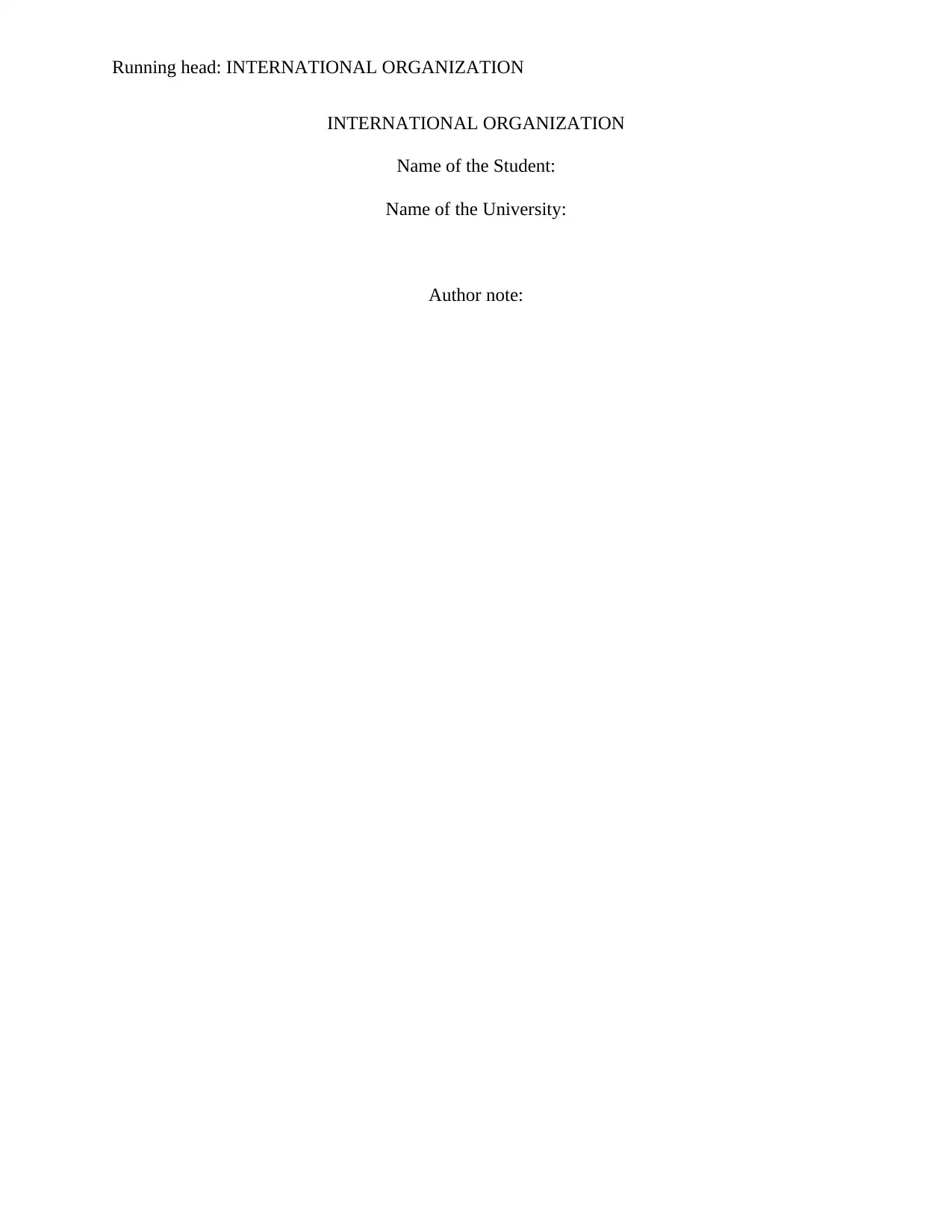
Running head: INTERNATIONAL ORGANIZATION
INTERNATIONAL ORGANIZATION
Name of the Student:
Name of the University:
Author note:
INTERNATIONAL ORGANIZATION
Name of the Student:
Name of the University:
Author note:
Secure Best Marks with AI Grader
Need help grading? Try our AI Grader for instant feedback on your assignments.
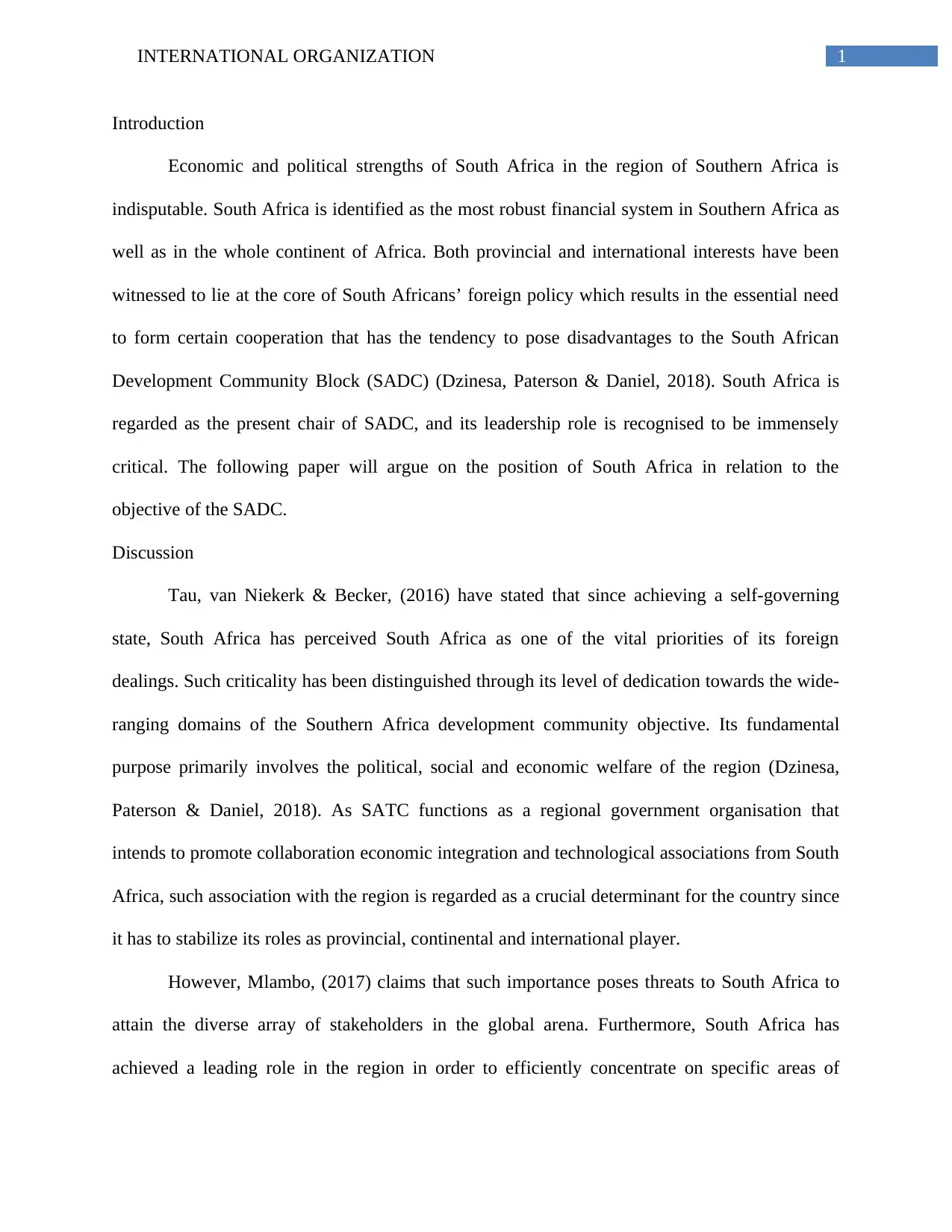
1INTERNATIONAL ORGANIZATION
Introduction
Economic and political strengths of South Africa in the region of Southern Africa is
indisputable. South Africa is identified as the most robust financial system in Southern Africa as
well as in the whole continent of Africa. Both provincial and international interests have been
witnessed to lie at the core of South Africans’ foreign policy which results in the essential need
to form certain cooperation that has the tendency to pose disadvantages to the South African
Development Community Block (SADC) (Dzinesa, Paterson & Daniel, 2018). South Africa is
regarded as the present chair of SADC, and its leadership role is recognised to be immensely
critical. The following paper will argue on the position of South Africa in relation to the
objective of the SADC.
Discussion
Tau, van Niekerk & Becker, (2016) have stated that since achieving a self-governing
state, South Africa has perceived South Africa as one of the vital priorities of its foreign
dealings. Such criticality has been distinguished through its level of dedication towards the wide-
ranging domains of the Southern Africa development community objective. Its fundamental
purpose primarily involves the political, social and economic welfare of the region (Dzinesa,
Paterson & Daniel, 2018). As SATC functions as a regional government organisation that
intends to promote collaboration economic integration and technological associations from South
Africa, such association with the region is regarded as a crucial determinant for the country since
it has to stabilize its roles as provincial, continental and international player.
However, Mlambo, (2017) claims that such importance poses threats to South Africa to
attain the diverse array of stakeholders in the global arena. Furthermore, South Africa has
achieved a leading role in the region in order to efficiently concentrate on specific areas of
Introduction
Economic and political strengths of South Africa in the region of Southern Africa is
indisputable. South Africa is identified as the most robust financial system in Southern Africa as
well as in the whole continent of Africa. Both provincial and international interests have been
witnessed to lie at the core of South Africans’ foreign policy which results in the essential need
to form certain cooperation that has the tendency to pose disadvantages to the South African
Development Community Block (SADC) (Dzinesa, Paterson & Daniel, 2018). South Africa is
regarded as the present chair of SADC, and its leadership role is recognised to be immensely
critical. The following paper will argue on the position of South Africa in relation to the
objective of the SADC.
Discussion
Tau, van Niekerk & Becker, (2016) have stated that since achieving a self-governing
state, South Africa has perceived South Africa as one of the vital priorities of its foreign
dealings. Such criticality has been distinguished through its level of dedication towards the wide-
ranging domains of the Southern Africa development community objective. Its fundamental
purpose primarily involves the political, social and economic welfare of the region (Dzinesa,
Paterson & Daniel, 2018). As SATC functions as a regional government organisation that
intends to promote collaboration economic integration and technological associations from South
Africa, such association with the region is regarded as a crucial determinant for the country since
it has to stabilize its roles as provincial, continental and international player.
However, Mlambo, (2017) claims that such importance poses threats to South Africa to
attain the diverse array of stakeholders in the global arena. Furthermore, South Africa has
achieved a leading role in the region in order to efficiently concentrate on specific areas of
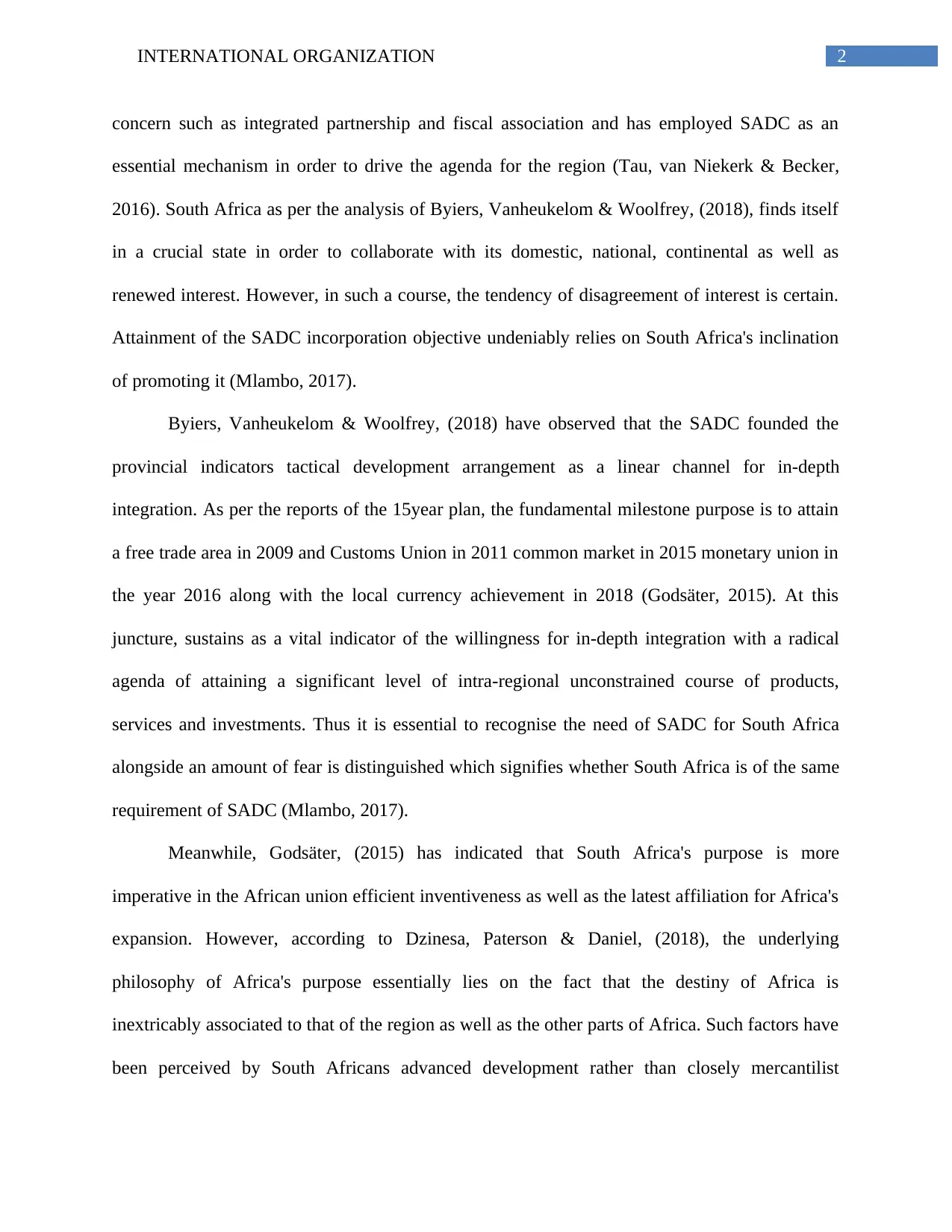
2INTERNATIONAL ORGANIZATION
concern such as integrated partnership and fiscal association and has employed SADC as an
essential mechanism in order to drive the agenda for the region (Tau, van Niekerk & Becker,
2016). South Africa as per the analysis of Byiers, Vanheukelom & Woolfrey, (2018), finds itself
in a crucial state in order to collaborate with its domestic, national, continental as well as
renewed interest. However, in such a course, the tendency of disagreement of interest is certain.
Attainment of the SADC incorporation objective undeniably relies on South Africa's inclination
of promoting it (Mlambo, 2017).
Byiers, Vanheukelom & Woolfrey, (2018) have observed that the SADC founded the
provincial indicators tactical development arrangement as a linear channel for in-depth
integration. As per the reports of the 15year plan, the fundamental milestone purpose is to attain
a free trade area in 2009 and Customs Union in 2011 common market in 2015 monetary union in
the year 2016 along with the local currency achievement in 2018 (Godsäter, 2015). At this
juncture, sustains as a vital indicator of the willingness for in-depth integration with a radical
agenda of attaining a significant level of intra-regional unconstrained course of products,
services and investments. Thus it is essential to recognise the need of SADC for South Africa
alongside an amount of fear is distinguished which signifies whether South Africa is of the same
requirement of SADC (Mlambo, 2017).
Meanwhile, Godsäter, (2015) has indicated that South Africa's purpose is more
imperative in the African union efficient inventiveness as well as the latest affiliation for Africa's
expansion. However, according to Dzinesa, Paterson & Daniel, (2018), the underlying
philosophy of Africa's purpose essentially lies on the fact that the destiny of Africa is
inextricably associated to that of the region as well as the other parts of Africa. Such factors have
been perceived by South Africans advanced development rather than closely mercantilist
concern such as integrated partnership and fiscal association and has employed SADC as an
essential mechanism in order to drive the agenda for the region (Tau, van Niekerk & Becker,
2016). South Africa as per the analysis of Byiers, Vanheukelom & Woolfrey, (2018), finds itself
in a crucial state in order to collaborate with its domestic, national, continental as well as
renewed interest. However, in such a course, the tendency of disagreement of interest is certain.
Attainment of the SADC incorporation objective undeniably relies on South Africa's inclination
of promoting it (Mlambo, 2017).
Byiers, Vanheukelom & Woolfrey, (2018) have observed that the SADC founded the
provincial indicators tactical development arrangement as a linear channel for in-depth
integration. As per the reports of the 15year plan, the fundamental milestone purpose is to attain
a free trade area in 2009 and Customs Union in 2011 common market in 2015 monetary union in
the year 2016 along with the local currency achievement in 2018 (Godsäter, 2015). At this
juncture, sustains as a vital indicator of the willingness for in-depth integration with a radical
agenda of attaining a significant level of intra-regional unconstrained course of products,
services and investments. Thus it is essential to recognise the need of SADC for South Africa
alongside an amount of fear is distinguished which signifies whether South Africa is of the same
requirement of SADC (Mlambo, 2017).
Meanwhile, Godsäter, (2015) has indicated that South Africa's purpose is more
imperative in the African union efficient inventiveness as well as the latest affiliation for Africa's
expansion. However, according to Dzinesa, Paterson & Daniel, (2018), the underlying
philosophy of Africa's purpose essentially lies on the fact that the destiny of Africa is
inextricably associated to that of the region as well as the other parts of Africa. Such factors have
been perceived by South Africans advanced development rather than closely mercantilist
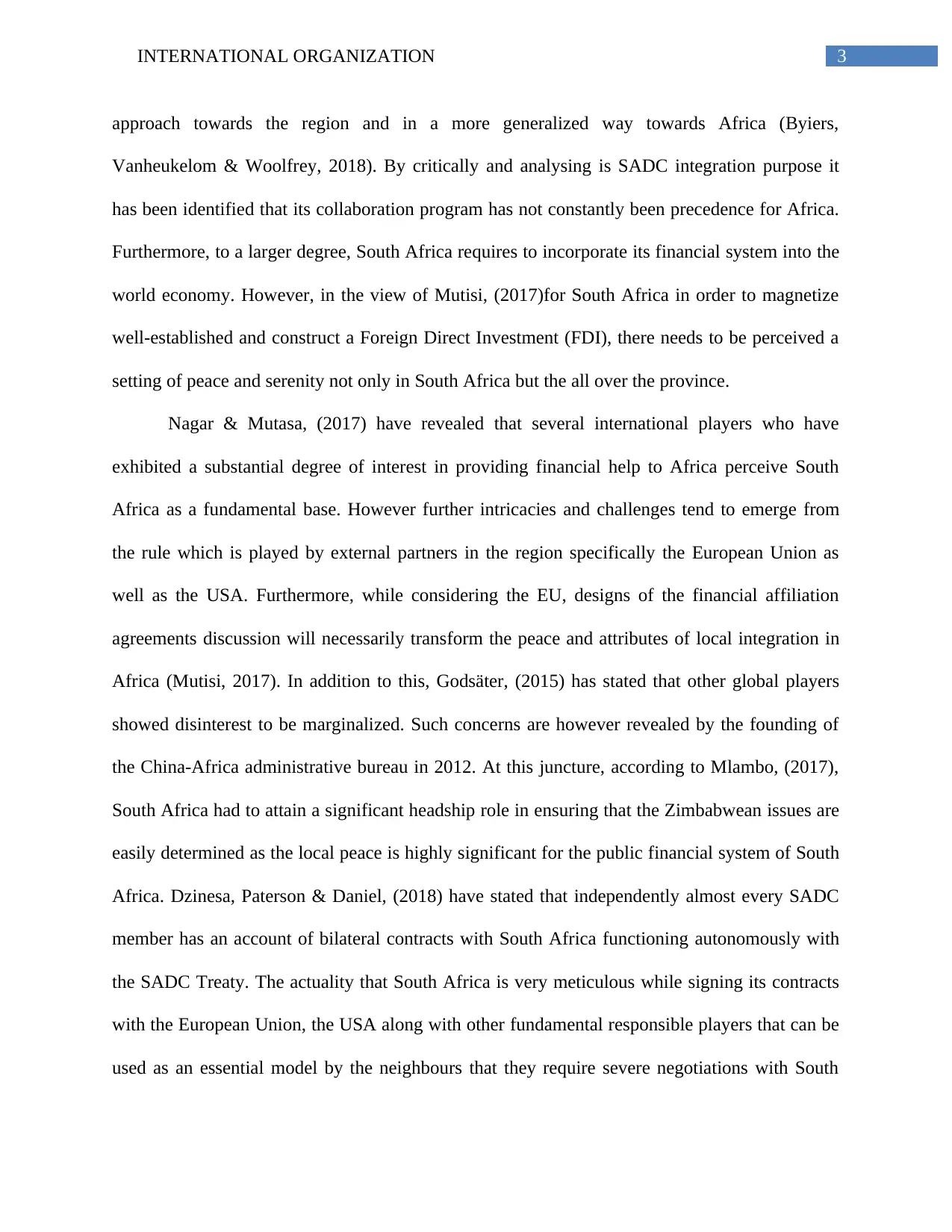
3INTERNATIONAL ORGANIZATION
approach towards the region and in a more generalized way towards Africa (Byiers,
Vanheukelom & Woolfrey, 2018). By critically and analysing is SADC integration purpose it
has been identified that its collaboration program has not constantly been precedence for Africa.
Furthermore, to a larger degree, South Africa requires to incorporate its financial system into the
world economy. However, in the view of Mutisi, (2017)for South Africa in order to magnetize
well-established and construct a Foreign Direct Investment (FDI), there needs to be perceived a
setting of peace and serenity not only in South Africa but the all over the province.
Nagar & Mutasa, (2017) have revealed that several international players who have
exhibited a substantial degree of interest in providing financial help to Africa perceive South
Africa as a fundamental base. However further intricacies and challenges tend to emerge from
the rule which is played by external partners in the region specifically the European Union as
well as the USA. Furthermore, while considering the EU, designs of the financial affiliation
agreements discussion will necessarily transform the peace and attributes of local integration in
Africa (Mutisi, 2017). In addition to this, Godsäter, (2015) has stated that other global players
showed disinterest to be marginalized. Such concerns are however revealed by the founding of
the China-Africa administrative bureau in 2012. At this juncture, according to Mlambo, (2017),
South Africa had to attain a significant headship role in ensuring that the Zimbabwean issues are
easily determined as the local peace is highly significant for the public financial system of South
Africa. Dzinesa, Paterson & Daniel, (2018) have stated that independently almost every SADC
member has an account of bilateral contracts with South Africa functioning autonomously with
the SADC Treaty. The actuality that South Africa is very meticulous while signing its contracts
with the European Union, the USA along with other fundamental responsible players that can be
used as an essential model by the neighbours that they require severe negotiations with South
approach towards the region and in a more generalized way towards Africa (Byiers,
Vanheukelom & Woolfrey, 2018). By critically and analysing is SADC integration purpose it
has been identified that its collaboration program has not constantly been precedence for Africa.
Furthermore, to a larger degree, South Africa requires to incorporate its financial system into the
world economy. However, in the view of Mutisi, (2017)for South Africa in order to magnetize
well-established and construct a Foreign Direct Investment (FDI), there needs to be perceived a
setting of peace and serenity not only in South Africa but the all over the province.
Nagar & Mutasa, (2017) have revealed that several international players who have
exhibited a substantial degree of interest in providing financial help to Africa perceive South
Africa as a fundamental base. However further intricacies and challenges tend to emerge from
the rule which is played by external partners in the region specifically the European Union as
well as the USA. Furthermore, while considering the EU, designs of the financial affiliation
agreements discussion will necessarily transform the peace and attributes of local integration in
Africa (Mutisi, 2017). In addition to this, Godsäter, (2015) has stated that other global players
showed disinterest to be marginalized. Such concerns are however revealed by the founding of
the China-Africa administrative bureau in 2012. At this juncture, according to Mlambo, (2017),
South Africa had to attain a significant headship role in ensuring that the Zimbabwean issues are
easily determined as the local peace is highly significant for the public financial system of South
Africa. Dzinesa, Paterson & Daniel, (2018) have stated that independently almost every SADC
member has an account of bilateral contracts with South Africa functioning autonomously with
the SADC Treaty. The actuality that South Africa is very meticulous while signing its contracts
with the European Union, the USA along with other fundamental responsible players that can be
used as an essential model by the neighbours that they require severe negotiations with South
Secure Best Marks with AI Grader
Need help grading? Try our AI Grader for instant feedback on your assignments.
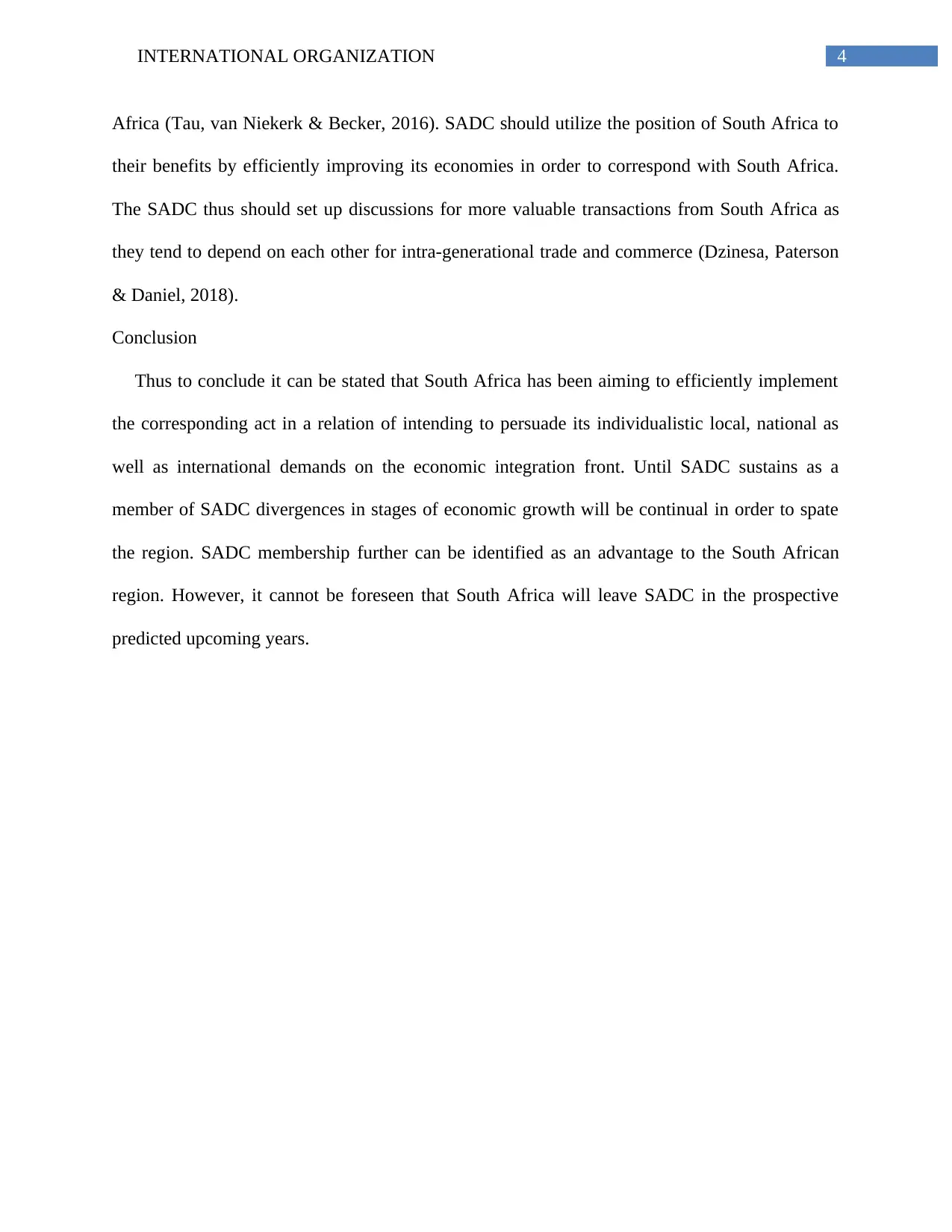
4INTERNATIONAL ORGANIZATION
Africa (Tau, van Niekerk & Becker, 2016). SADC should utilize the position of South Africa to
their benefits by efficiently improving its economies in order to correspond with South Africa.
The SADC thus should set up discussions for more valuable transactions from South Africa as
they tend to depend on each other for intra-generational trade and commerce (Dzinesa, Paterson
& Daniel, 2018).
Conclusion
Thus to conclude it can be stated that South Africa has been aiming to efficiently implement
the corresponding act in a relation of intending to persuade its individualistic local, national as
well as international demands on the economic integration front. Until SADC sustains as a
member of SADC divergences in stages of economic growth will be continual in order to spate
the region. SADC membership further can be identified as an advantage to the South African
region. However, it cannot be foreseen that South Africa will leave SADC in the prospective
predicted upcoming years.
Africa (Tau, van Niekerk & Becker, 2016). SADC should utilize the position of South Africa to
their benefits by efficiently improving its economies in order to correspond with South Africa.
The SADC thus should set up discussions for more valuable transactions from South Africa as
they tend to depend on each other for intra-generational trade and commerce (Dzinesa, Paterson
& Daniel, 2018).
Conclusion
Thus to conclude it can be stated that South Africa has been aiming to efficiently implement
the corresponding act in a relation of intending to persuade its individualistic local, national as
well as international demands on the economic integration front. Until SADC sustains as a
member of SADC divergences in stages of economic growth will be continual in order to spate
the region. SADC membership further can be identified as an advantage to the South African
region. However, it cannot be foreseen that South Africa will leave SADC in the prospective
predicted upcoming years.
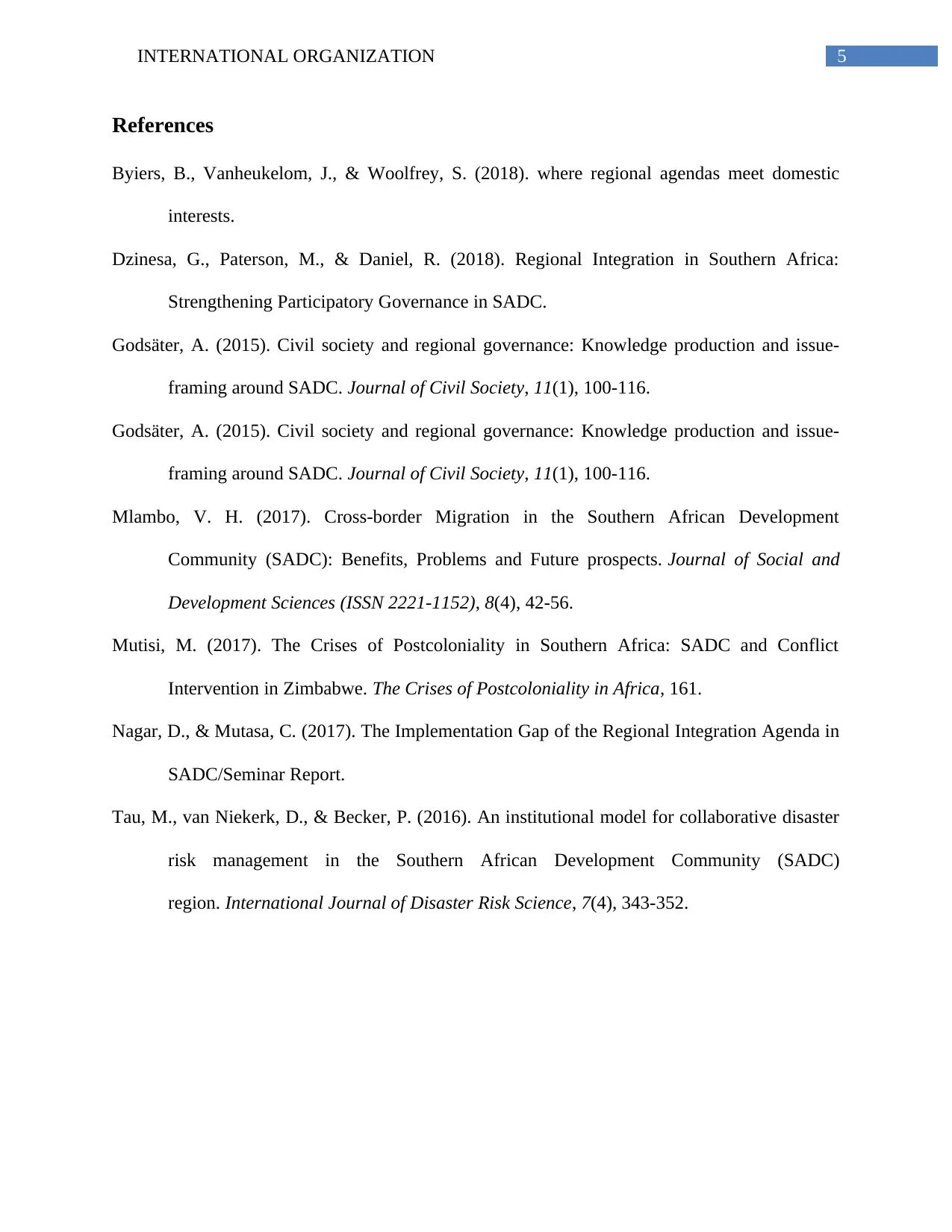
5INTERNATIONAL ORGANIZATION
References
Byiers, B., Vanheukelom, J., & Woolfrey, S. (2018). where regional agendas meet domestic
interests.
Dzinesa, G., Paterson, M., & Daniel, R. (2018). Regional Integration in Southern Africa:
Strengthening Participatory Governance in SADC.
Godsäter, A. (2015). Civil society and regional governance: Knowledge production and issue-
framing around SADC. Journal of Civil Society, 11(1), 100-116.
Godsäter, A. (2015). Civil society and regional governance: Knowledge production and issue-
framing around SADC. Journal of Civil Society, 11(1), 100-116.
Mlambo, V. H. (2017). Cross-border Migration in the Southern African Development
Community (SADC): Benefits, Problems and Future prospects. Journal of Social and
Development Sciences (ISSN 2221-1152), 8(4), 42-56.
Mutisi, M. (2017). The Crises of Postcoloniality in Southern Africa: SADC and Conflict
Intervention in Zimbabwe. The Crises of Postcoloniality in Africa, 161.
Nagar, D., & Mutasa, C. (2017). The Implementation Gap of the Regional Integration Agenda in
SADC/Seminar Report.
Tau, M., van Niekerk, D., & Becker, P. (2016). An institutional model for collaborative disaster
risk management in the Southern African Development Community (SADC)
region. International Journal of Disaster Risk Science, 7(4), 343-352.
References
Byiers, B., Vanheukelom, J., & Woolfrey, S. (2018). where regional agendas meet domestic
interests.
Dzinesa, G., Paterson, M., & Daniel, R. (2018). Regional Integration in Southern Africa:
Strengthening Participatory Governance in SADC.
Godsäter, A. (2015). Civil society and regional governance: Knowledge production and issue-
framing around SADC. Journal of Civil Society, 11(1), 100-116.
Godsäter, A. (2015). Civil society and regional governance: Knowledge production and issue-
framing around SADC. Journal of Civil Society, 11(1), 100-116.
Mlambo, V. H. (2017). Cross-border Migration in the Southern African Development
Community (SADC): Benefits, Problems and Future prospects. Journal of Social and
Development Sciences (ISSN 2221-1152), 8(4), 42-56.
Mutisi, M. (2017). The Crises of Postcoloniality in Southern Africa: SADC and Conflict
Intervention in Zimbabwe. The Crises of Postcoloniality in Africa, 161.
Nagar, D., & Mutasa, C. (2017). The Implementation Gap of the Regional Integration Agenda in
SADC/Seminar Report.
Tau, M., van Niekerk, D., & Becker, P. (2016). An institutional model for collaborative disaster
risk management in the Southern African Development Community (SADC)
region. International Journal of Disaster Risk Science, 7(4), 343-352.
1 out of 6
Your All-in-One AI-Powered Toolkit for Academic Success.
+13062052269
info@desklib.com
Available 24*7 on WhatsApp / Email
![[object Object]](/_next/static/media/star-bottom.7253800d.svg)
Unlock your academic potential
© 2024 | Zucol Services PVT LTD | All rights reserved.